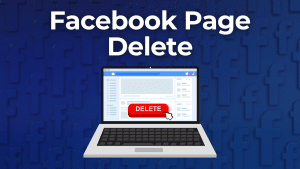
Did you know that you can delete a Facebook business page?
Managing your online presence could require you to delete your Facebook page. Whether you’re streamlining your social media portfolio, rebranding, or simply stepping away from Facebook, deleting a page is a significant step.
This guide will walk you through deleting your Facebook business page, ensuring it’s as smooth and trouble-free as possible.
How To Delete a Business Facebook Page
You can delete a Facebook page in a few steps. However, you should ensure you’re ready to let go permanently. Here are simple steps you can follow to delete your business Facebook page:
Step 1: Log into your account.
Open Facebook on your web browser and log in with the account with admin rights to the page.
Step 2: Go to your page.
Click on the drop-down arrow in the upper right corner of your screen and select your business page under ‘Your Pages.’
Step 3: Access settings.
Once on your page, click ‘Settings’ at the bottom of the left menu.
Step 4: Go to general page settings.
In the Settings menu, select the ‘General’ tab.
Step 5: Delete your page.
Scroll down to the bottom of the General settings, where you’ll find ‘Remove Page.’ Click on ‘Delete [Page Name].’ Facebook will ask you to confirm your decision.
Step 6: Confirm deletion request.
Click ‘Delete Page’ in the confirmation window and enter your Facebook password. Remember, Facebook will hold the deletion for 14 days, during which you can cancel the process. After that, the deleted Facebook page will be permanently deleted.
What Is the Difference Between Deactivation and Deleting Business Page on Facebook?

Understanding the difference between deleting and deactivating a page is crucial. Both actions can significantly impact how you manage your digital presence on the platform. Below, we will explore the difference between deactivating and deleting business page on Facebook:
Deactivation.
Deactivating a Facebook Page is akin to putting it on pause. This option is ideal if you anticipate needing the page again or wish to temporarily hide it from public view.
After deactivating, the page becomes invisible to the public but remains accessible to administrators. Also, all your content, including posts, photos, and user interactions, is saved. You can reactivate the page anytime and pick up where you left off.
Deletion.
Deleting a Facebook Page is a permanent action. Once deleted, the page and all its content cannot be recovered. This is the best option if you are sure you no longer need the page and want to remove all traces of it from Facebook.
This action completely removes the page from Facebook after a 14-day grace period, during which you can still cancel the deletion. Choosing this option helps you declutter your digital presence if the page is no longer relevant or needed.
Why Delete Your Facebook Pages?
There comes a time when the decision to delete your personal account or Facebook Page might not only be necessary but beneficial. Below, we will discuss why someone might consider taking this significant step to delete Facebook pages:
1. Rebranding or strategic shifts.
One of the most common reasons for deleting a Facebook page is rebranding. If a business undergoes a significant transformation, be it a name change, merger, or shift in market focus, keeping an old business Facebook page might lead to confusion. Deleting an outdated page can pave the way for a fresh start and a new page that better represents the current brand identity.
2. Reducing complexity.
Managing multiple Facebook Pages can be a logistical nightmare, especially for small businesses with limited resources. Each page requires content creation, audience engagement, and regular updates, all of which consume time and energy. By deleting less critical or outdated pages, a business can focus its efforts on a single, more impactful page, leading to improved management and engagement.
3. Low engagement and activity.
Sometimes, despite best efforts, a page fails to engage an audience. Low engagement rates can be demoralizing and may not justify the investment of time and resources. Deleting a non-performing page allows you to reallocate resources to more effective marketing strategies or platforms that better resonate with your target audience.
4. Outdated information.
Pages that have been neglected or are no longer updated can become repositories of outdated information. Outdated Facebook page information can mislead visitors and negatively impact a brand’s reputation. Deleting such pages can help maintain the integrity and accuracy of the information communicated to the public.
5. Privacy and security concerns.
In today’s digital age, privacy and security are paramount. Companies may delete a Facebook page to protect sensitive information or respond to security breaches. Reducing digital exposure can prevent future risks and safeguard an organization’s or individual’s privacy.
Conclusion
Deleting a Facebook Page is a permanent action that requires careful consideration. Whether your goal is to declutter your digital presence, focus on new areas, or protect your privacy, handling the process thoughtfully is important to avoid regrets. Follow the steps outlined above to ensure your page deletion is handled efficiently and effectively.
Would you like to market your goods or services on Facebook? Contact the best Facebook ad agency.
Frequently Asked Questions
Can I delete a Facebook page if I’m not the admin?
No, only the page’s admin can delete the Facebook page.
What happens to the content I have on my Facebook page once it is deleted?
Once the deletion process is completed, all content associated with the page is permanently deleted and cannot be recovered.
Is there an alternative to deleting my Facebook page?
If you are still deciding to permanently delete your Facebook page, you can deactivate it.
Related Articles
Facebook Messenger Bots for Marketing
